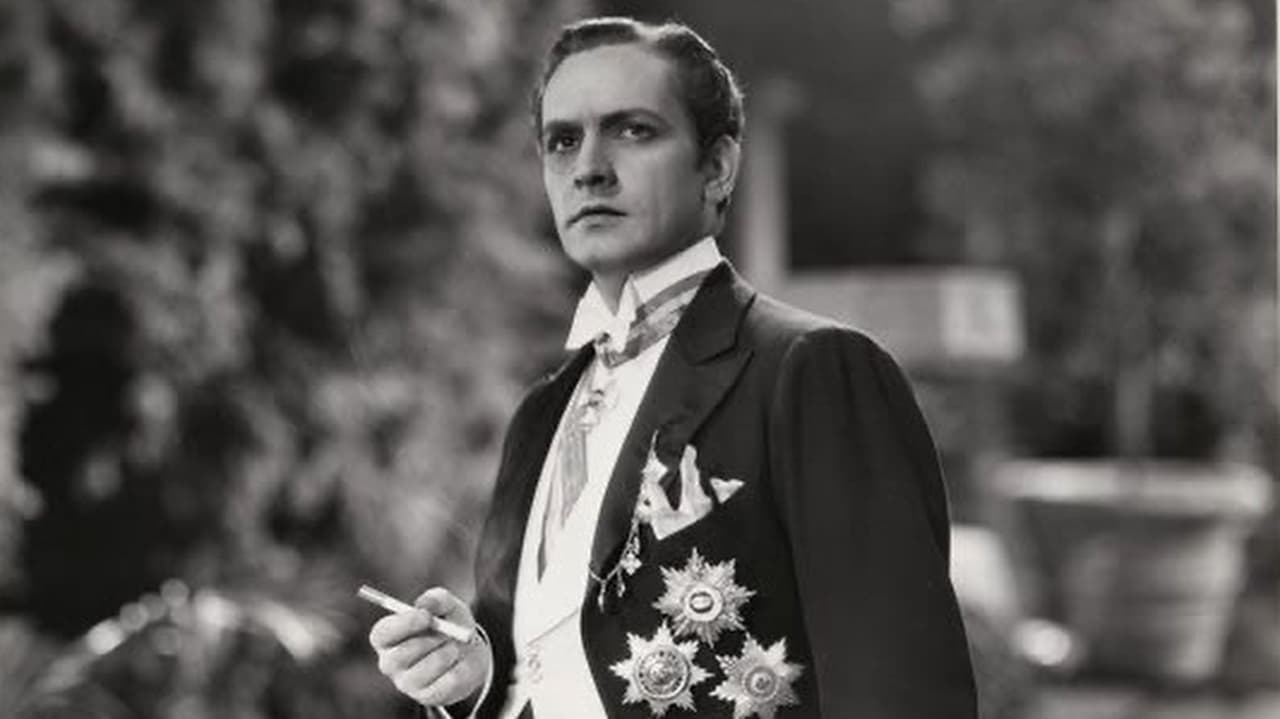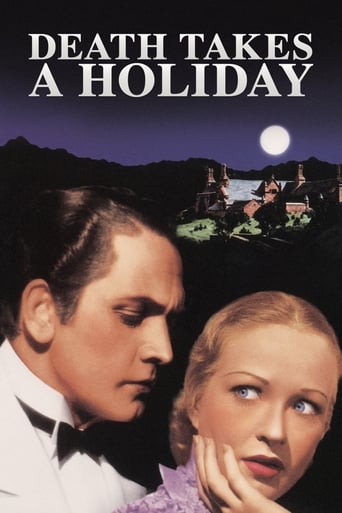

the audience applauded
... View MoreCrappy film
... View MoreA Disappointing Continuation
... View Moren my opinion it was a great movie with some interesting elements, even though having some plot holes and the ending probably was just too messy and crammed together, but still fun to watch and not your casual movie that is similar to all other ones.
... View MoreDEATH TAKES A HOLIDAY (Paramount, 1934), directed by Mitchell Leisen, is not essentially a horror movie but a sort of haunting fantasy story about an Angel of Death descending upon mortals in the guise of a handsome young nobleman. Taken from the play by Alberto Castella, it stars Fredric March in one of his finer roles for the studio shortly before leaving for free-lancing assignments. Although March was the leading man, DEATH TAKES A HOLIDAY virtually belongs to Evelyn Venable in a role that might or should have marked the beginning to a string of successful starring roles for her. While Venable does give a splendid performance, she never rose in the ranks of top Hollywood actress of her day.As the opening credits roll with the camera capturing a gathering of happy crowds at a carnival, the supporting players, including Sir Guy Standing (Duke Lambert); Helen Westley (Stephanie); Henry Travers (Baron Cedsarea); Katherine Alexander (Countess Alda Di Parmal); G.P. Huntley Jr. (Eric Bagley); Gail Patrick (Rhonda Fenton); and Kent Taylor (Corrado, Grazia's fiancé) are credited with their roles while still in characters, before shifting into a church where Grazia (Evelyn Venable) is seen alone praying. After leaving the carnival in two separate cars, Grazia notices a dark shadow following them before passing ahead. The other members of the party meet with an accident regarding a vendor and his cart, but no one is hurt nor injured. After a gathering at their Villa Felicita, by which Grazia faints after being approached by a dark cloak figure, that same shadowy figure approaches Duke Lambert soon after all the guests have retired for the night. The voice introduces himself as Death, explaining his mission where he is to spend a three day holiday among mortals to understand why he is so feared. With Duke Lambert keeping his secret, Death immediately arrives at the estate masquerading as Prince Sirki (Fredric March) where he then meets with the guests. During those three days, no death occurs, even to those who survived unanswered miracles. As Rhoda and Alda become fascinated by this nobleman, Sirki becomes fascinated in Grazia, who doesn't fear him at all. After resulting his mission, Sirki's situation of departing alone or with Grazia becomes his newfound problem. Also in the story are Kathleen Howard (Princess Maria, Grazia's Mother); Frank Yaconelli (The Vendor); and Hector Sarno (Pietro).Very much a filmed stage play, it doesn't have that feel by any means. Other than underscoring in certain scenes to some classical music, there are brief montages set in other places as the horse or auto races to break the monotony of story set mostly inside a mansion. There are also screen fills of newspaper clippings of certain outside incidents as the sinking of the S.S. Cedric where no lives are lost. Fredric March, whose physical being as the accented speaking prince, complete with monocle and military clothes, doesn't appear until 27 minutes from the start of the movie. He gets his one frightful moment when he asks a woman to come closer to him to see who he really is, but otherwise, just a mysterious house guest learning what life if all about. As mentioned before, Evelyn Venable is the sole attraction here, with Sir Guy Standing not very far as the terrified nobleman.Remade as a television movie (1971) featuring veteran performers as Melvyn Douglas and Myrna Loy, followed years later by an updated nearly three-hour version re-titled MEET JOE BLACK (Universal, 1991) with Brad Pitt, the 1934 original remains the most appreciated of the three. Not as commonly broadcast on commercial television as it once was back in the 1960s and 70s, DEATH TAKES A HOLIDAY turned up in later years on public television before shifting occasionally on cable channels as Showtime (1990); American Movie Classics (1992) and Turner Classic Movies (TCM premiere: March 6, 2005). Though the movie has taken a holiday from the television airwaves, and distributed to home video (1998) and DVD (2004), regardless of its age and stage origins, it's still an interesting premise to what life can become if death does take a holiday. Oh Death, where is thy sting? (***1/2)
... View MoreForget about the green mist of "The Ten Commandments" skipping doors with blood painted on them, or the cloaked skeleton pointing his dinner at a bunch of people who ate the Salmon Moose in "Monty Python's The Meaning of Life", or even the comical figure on "Family Guy". This view of the angel of death is profound, almost romantic, with sincerity and integrity. "Has it ever occurred to you that death may be more simpler than life?", Death (Fredric March) asks. I certainly hope so!Appearing to Sir Guy Standing as an unfaced dark mist, he tells him (in March's voice) that he will be soon joining them in the guise of the Russian nobleman scheduled to visit them that "won't be there himself". All but Standing believe him to be this member of the Russian aristocracy, and as his dark presence creates discord, life is saved for aging flowers, accident victims (seen in presumed newsreel footage) and the aging certain to die as soon as he returns to his duties. Death searches for love during his brief visit with life, finding only fear in the souls of two of the beautiful women (Gail Patrick and Katherine Alexander) in attendance. Only one, the sweet Evelyn Venable, whose purity touches him, does not fear him, and this creates fear in the family as well as their visitors as they comprehend the truth.Almost operatic in its tragedy, this actually did become a critically acclaimed Off-Broadway musical drama. The film version of the stage play is solemn, yet not depressing or morbid. It certainly constitutes discussion, and "Death", itself, makes observations about the selfishness of the living in not accepting the act of death as part of life, and not letting the dead rest in peace.Venable's demeanor of the gentile noblewoman is almost saintly, as she seems to welcome Death's presence in her life without even an ounce of fear while her parents (Katherine Howard and Henry Travers) obviously have the earthly view of "She's too young to be taken" and "What will we do without her?". The beloved Helen Westley is sweetly noble as Standing's wife, while her matriarchal character in the musical became a maturing beauty played by the striking Rebecca Luker. While the title indicates that this could be either a comedy or a horror movie, it is in fact, a love story of two worlds forbidden from meeting, let alone falling in love. Of course, the cinematography is at times almost like the early sound horror movies, and it is indeed haunting. Director Mitchell Leisen prevents it from ever becoming sappy or mellow, and at the end, you might feel that the two forbidden lovers are triumphant.
... View MoreDeath Takes a Holiday (1934) *** 1/2 (out of 4) Death (Fredric March), curious to know why people fear him, takes on human form for a three day vacation. Things get a bit complicated when he falls in love with a woman who also loves him. This is a wonderful little film that mixes comedy, drama and various horror elements to a great effect. March is wonderful as usual and blends the perfect amount of caring and horror. His performance here is so much better than in Dr. Jekyll and Mr. Hyde. The actual horror elements of Death are among the best ever from this period.Sadly, Universal has only issued this film on its remake DVD as an extra nnd now that is out of print. Hopefully this film will get the respect it's due.
... View MoreIf Death took a holiday, the guns would go silent in Iraq, the slaughter on our nation's highways would cease, and the news media would be compelled to cover positive events in the humanities, arts, and sciences. Unfortunately, Death has not had a vacation in recorded history, but Mitchell Leisen's 1934 fantasy, Death Takes a Holiday, allows us to consider the possibility. Co-written by Maxwell Anderson and Gladys Lehman and based on the play "La Morte in Vacanza" by Alberto Casella, Death Takes a Holiday stars Frederic March as the Grim Reaper who takes on human form in an attempt to discover why men fear him so much. Why he has waited 5,000 years to satisfy this curiosity is not explained.After a brief tryout as a shadowy figure who scares the daylights out of those that cross his path, Death shows up at, of all places, an upscale party at an Italian villa, posing as the mysterious Prince Sirki. Only one person knows who he really is, the host Duke Lambert (Guy Standing), and he is sworn to secrecy. Sirki proceeds to fascinate the guests. Given to bursts of wit and poetry, he can just as quickly turn sullen and threatening, and some soon find out that it is better not to look too deeply into his eyes. During the three days in which the Prince is at the villa, however, people all over the world miraculously escape death and potential suicides are doomed to frustration.To see what's behind all the conversation about love, the suave but naive Prince Sirki falls for the irresistible Grazia (Evelyn Venable), the daughter of one of Duke's friends. Grazia knows who Death is but does not fear him, much to the chagrin of her fiancé, Corrado (Kent Taylor) who has developed a strong disdain for Prince Charming. More sinister than Brad Pitt in the 1998 remake Meet Joe Black, March turns in a very convincing performance as the creepy yet strangely appealing guest. Although the ending is melodramatic, the emotions are very real and the suggestion that Death may in reality be a friend disguised as a foe is quite touching.
... View More